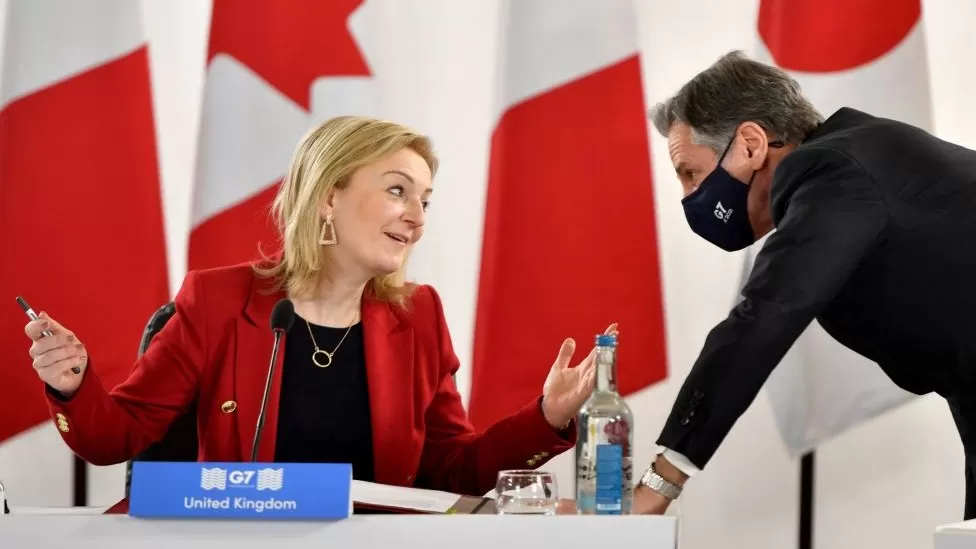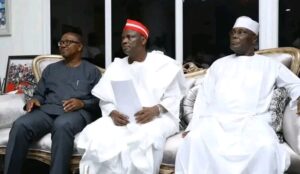
BY ABUSOLA TEMITOPE JOHNSON
Global leaders have been sending their congratulations to the UK’s new Prime Minister, Liz Truss, but in the international media, there have been snarkier remarks, too.
“She has gone to see the Queen,” said Russian television presenter Ivan Trushkin. “If she [the Queen] recognises her of course.”
In France, meanwhile, she has been branded not the Iron Lady – which was former UK PM Margaret Thatcher’s nickname – but the Iron Weathercock.
This is a reference to Ms Truss’s changing views on the UK leaving the European Union – she went from opponent before the 2016 referendum, to supporter afterwards, saying in July that “some of the portents of doom didn’t happen”. It’s believed the term was first coined in Les Echos in July – but has since caught on among some commentators.
French President Emmanuel Macron said he had offered Liz Truss his congratulations, adding that he had told her: “We are available to work as allies and friends.”
“The United Kingdom is a great country that, like us, is committed to defending democracy, by the side of Ukraine, and that also needs to strengthen its energy sovereignty and win the battle against climate change,” the French leader said.
The first leader to congratulate publicly Ms Truss was German Chancellor Olaf Scholz.
“In these challenging times,” he wrote in English, London and Berlin would carry on co-operating as “partners and friends”.
Warm words also came from EU Commission President Ursula von der Leyen – but not without an apparent reference to the Brexit-related Northern Ireland protocol.
“I look forward to a constructive relationship, in full respect of our agreements,” she said in a tweet.
India’s Prime Minister Narendra Modi wished Liz Truss the “very best”, Poland’s Mateusz Morawiecki said he was “very, very pleased” by her commitment to Ukraine.
“She will make [Boris] Johnson seem a political genius, [Theresa] May a mistress of empathy, David Cameron a beacon of sincerity,” Fintan O’Toole wrote in The Irish Times, referring to Ms Truss’s Conservative predecessors.
As expected, the reaction from Russia has been more negative, with presenters on Gazprom-owned NTV describing Ms Truss’s election as a “catastrophe” for the UK.
Russian Foreign Minister Sergei Lavrov accused the former UK foreign secretary of being unwilling to compromise and said her approach would not help the UK internationally.
“London has for quite a long time been actively trying to compensate for the loss of identity and influence in the EU by taking drastic steps on the world stage,” he said.
However, Ms Truss’s win was welcomed by other Russians. Leonid Volkov, chief of staff for jailed opposition leader Alexei Navalny, said it was “excellent news”.
“In the Kremlin, they were cracking open the champagne when Johnson resigned, but there are no grounds for supposing that Truss will be a softer touch,” he wrote on Twitter (in Russian).
Ukraine’s President Volodymyr Zelensky said he looked forward to working with Ms Truss.
“We in Ukraine know her well – she has always been on the bright side of European politics,” he said. “And I believe that together we will be able to do a lot more to protect our nations and to thwart all Russian destructive efforts.”
Promising to send congratulations, China’s foreign ministry said it hoped the UK would join China in developing “bilateral relations on the basis of mutual respect and win-win co-operation”.
However, one prominent Chinese journalist offered a pessimistic view of the UK’s future under Truss.
“Truss will likely be one of Britain’s most mediocre prime ministers,” tweeted Hu Xijin, a commentator for the Chinese Communist Party-affiliated Global Times. “Truss has the will to be Britain’s ‘new iron lady’, but she may not have Thatcher’s fate.”






